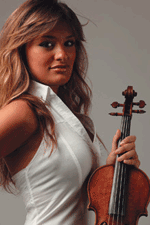> [Archived] Interviews

Interview with Nicola Benedetti
Nicola Benedetti, we already know that your father is Italian and your mother is Scottish. We don`t know however if there is a connection between your family and music.
There is no direct connection. They love music but they did not turn it into a profession. I ended up having a music career due to the very good violin school in our area. My sister used to play the violin when she was very young, so she asked our mother if we could take lessons together and this is how I started studying this instrument.
What personality trait did you inherit from your parents?
This is not easy to answer. My father is a very vibrant and determined person who believes that nothing is impossible, and my mother is very hard working and reasoned, making the most of every situation. Moreover, I believe she has a certain inclination for music although she has never played an instrument.
You have recently performed in Venezuela with the Simon Bolivar Youth Orchestra. According to the information we got from your official Facebook page, you consider that the "El Sistema" program can also be applied in the UK. What is it that you appreciated the most about this music education program?
Its vast scale, the fact that it is not intended for those who can afford to pay their tuition or for families that encourage their children to learn to play an instrument, but for everyone. It is amazing that there are 4000 children who learned to play an instrument in this system. My visit to Venezuela made me realise a natural fact: the musical system is very similar to the one used in European conservatories and music schools. Teachers are the same, they have the same duties, the only difference is that in Venezuela, children study more. In Scotland we already have a similar program, El Sistema Scotland, which started three years ago and is working incredibly well. I personally think it should be used on a more larger scale so that more children can benefit from it. There are currently 300 children in the program and we need 30.000!
In 2005 you undertook a tour of UK schools with the aim of encouraging people of all ages to take pleasure in playing music and a favourite instrument. How did this initiative begin?
As you mentioned before, I performed in schools and I tried to take part in educational programs as much as possible. Now more than ever, young people need an identity, they need to feel we support them and that they belong to a community.They also have access to a form of cultural education. The idea of setting up an ochestra, teaching them how to play an instrument and then bring it into an orchestra would be another solved issue from our plan of giving children what modern society is lacking.
We are talking about music education so it is only fair to ask you how your musical career was influenced by your meeting with one of the most important figures of the twentieth century, Sir Yehudi Menuhin, George Enescu`s disciple, and also the patron of our festival?
I was about 10 or 11 when I met him and I played for him. Despide my young age, that encounter left me with memories I will never forget. There are things you cannot understand at such an early age, but even so, I immediately felt it was a once in a lifetime opportunity and that he was a great man. It was an unforgettable experience. I'm just sad I did not spend more time around him and that this opportunity did not repeat itself.
In Bucharest you will be performing with the London Symphony Orchestra, an ensemble you know due to previous collaborations. Could you tell us more about the projects you had together?
I made my first recording with the London Symphony Orchestra and Daniel Harding. It was a really unique experience for me.The members of the ensemble were all very supportive and nice to me. They are obviously wonderful people and I used to appreciate them even before making this recording. More than any other orchestra, they listen to what they play. I had a friend whose father used to play in this ensemble, so almost every weekend we would to go to their concerts, and that had a great impact on my musical education.
You will play the Violin Concerto by Glazunov. When did you add this work to your repertoire and what does it mean to you?
I learned it when I was 18 and played it for the first time with the Vancouver Symphony Orchestra. I think it is a great composition. Unfortunately it is not played too often and at least in the UK, it is not a very popular concerto. I try to play it as often as I possibly can in order to get the audience acquainted with it. At the forefront there is that very natural, late romantic era style. The last part is conceived as a dance. It is a very accessible concerto that I respect. The second part has a theme which seems to never end. It somewhat reminds me of Ceaikovski and the way he goes from one theme to another. It is a joyful musical work.
Is this the first time you visit Romania?
Yes, that is true. I am looking forward to this visit.
What are your thoughts around this concert in the George Enescu International Festival?
I know a lot about it, it is a very reputed festival. I saw the program, I will be in great company. I hope my performance will honor the festival. After the concert I will take some time to visit the city.
Translated by Casleanu Gianina-Aniela
MTTLC graduate, Bucharest University














